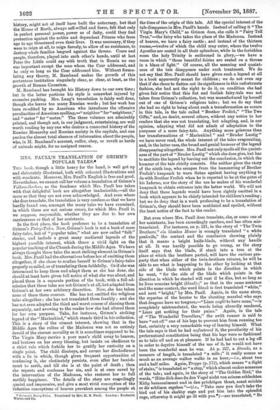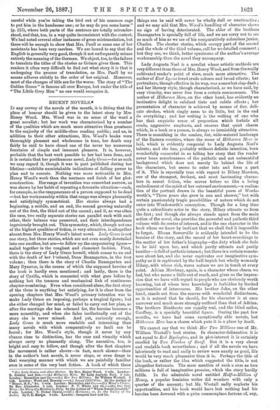MRS. PAULL'S TRANSLATION OF GRIMM'S POPULAR TALES.* Tuts book, though
a little heavy for the hand, is well got up and elaborately illustrated, both with coloured illustrations and with woodcuts. Moreover, Mrs. Paull's English is free and good, Nevertheless, we cannot call her volume a translation of Grimm's Voiksmithrehen, as the freedoms which Mrs. Paull has taken with that delightful book are altogether inadmissible,—all the more so that they are not even acknowledged. And even where she does translate, the translation is very careless,so that we have hardly found one, amongst the many tales we have examined, in which there are not serious errors, for which Mrs. Paull is, we suppose, responsible, whether they are due to her own carelessness or that of her assistants.
In the first place, the book professes to be a translation of Grimm's Fairy-Tales. Now, Grimm's book is not a book of mere fairy-tales, but of " popular tales," what are now called "folk" stories, and include a great many mediaeval legends of the highest possible interest, which throw a vivid light on the popular teaching of the Church during the Middle Ages. We have always thought these tales the most striking element in Grimm's book. Mrs. Paull had the alternatives before her of omitting them altogether, if she chose to confine herself to Grimm's fairy-tales properly so called, or of translating them faithfully. Or if she was determined to keep them and adapt them as she has done, she should at least have given fall notice of what she was about, and placed them in a separate portion of the book, with a full ad- mission that these tales are not Grimm's at all, but adapted from Grimm's at her own arbitrary discretion. Now, she has taken none of these three courses. She has not omitted the religious tales altogether ; she has not translated them frankly ; and she has not even adopted the third and worst course of classing them separately, and avowing to the reader how she had altered them for her own purpose. Take, for instance, Grimm's striking legend of the " Marienkind," which stands third in his collection. This is a story of the utmost interest, showing that in the Middle Ages the cultus of the Madonna was not so entirely devoid of the sterner morality as it is sometimes supposed to be. The Virgin Mary carries a poor man's child away to heaven, and bestows on her every blessing, but insists on obedience to a strict rule which forbids her to gratify her curiosity on a single point. The child disobeys, and covers her disobedience with a lie in which, though given frequent opportunities of confessing it, she obstinately persists, even after her banish- ment to earth, and till she is at the point of death ; then she repents and confesses her sin, and is at once saved by the intervention of the Madonna, who restores her to fall earthly happiness. The details of the story are exceedingly quaint and impressive, and give a most vivid conception of the infantine conceptions of heaven prevalent among the people at
• Grimes Fairy-Tales. Translated by Mrs. H. B. Paull. London Frederick Warne and Oo.
the time of the origin of this tale. All the special interest of the tale disappears in Mrs. Paull's hands. Instead of calling it " The Virgin Mary's Child," as Grimm does, she calls it "Fairy Tell True,"—the fairy who takes the place of the Madonna. Instead of heaven, we have a fairy castle ; and instead of the thirteen roome,—twelve of which the child may enter, where the twelve Apostles are seated in all their splendour, while in the forbidden room the holy Trinity is enthroned in glory,—we have a room in which " three beautiful fairies are seated on a throne in a blaze of light." Of course, all the meaning and quaint- ness of the tale disappears under such treatment. We do not say that Mrs. Paull should have given such a legend at all in a book apparently meant for children ; we do not even say that if she chose to flatten out its significance in this unfortunate fashion, she had not the right to do it, on condition she had given fair notice that this flat and foolish fairy-tale was not taken from Grimm's collection, but was manufactured by herself out of one of Grimm's religions tales ; but we do say that she had no right to bring about such a transformation as occurs in this tale, in the tale called "Brother Frolick," "The Two Gifts," and, no doubt, several others, without any notice to her readers that she was not translating, but adapting, and, in our opinion, adapting what did not admit of adaptation to the purposes of a mere fairy-tale. Anything more grievous than her transformations of " Marienkind " and "Bruder Lustig" we have never read, the whole interest of the tales evaporating, and, in the latter case, the broad and genial humour of the legend disappearing altogether. Mrs. Paull not only spoils all the quaint- ness of the part of " Brnder Lustig" which she does give, but has to mutilate the legend by leaving out the conclusion, in which the humour of the tale chiefly consists. She neither gives the story of the ninth imp, who escapes from the hammering of Brother Frolick's knapsack to warn Satan against having anything to do with Brother Frolick when he is reported to be at the gates of his Inferno, nor the story of the use he makes of his wonderful knapsack to obtain entrance into the better world. We will not deny that these legends would have been rightly omitted in a book which appears to be chiefly intended for children's reading ; but we do deny that in a work professing to be a translation of Grimm's, they should have been mutilated and spoiled, without the least notice of the fact to the reader.
But even where Mrs. Paull does translate, she, or some one of her assistants, has been exceedingly careless, and has often mis- translated. For instance, on p. 221, in the story of "The Twin Brothers," du blankes Messer is wrongly translated " a white penknife," the context and the conclusion showing plainly that it means a bright knife-blade, without any handle at all. It was hardly possible to go wrong, as the story itself says that the blade, if stuck into a tree at the place at which the brothers parted, will have the curious pro- perty that when either of the twin-brothers returns, he will be able to see what is happening to the other by looking at that side of the blade which points in the direction in which he went, " for the side of the blade which points in the direction in which he started will rust if he dies, but so long as he lives remains bright (blank) ;" so that in the same sentence and the same context, the word blank is first translated " white," and next " bright," by Mrs. Paull. Again, in the same story, the repartee of the hunter to the cheating marshal who says that dragons have no tongues,—"Liars ought to have none,"—is completely mistranslated, the words being absurdly rendered, "Liars get nothing for their pains." Again, in the tale of " The Wonderful Travellers," the swift runner is said to have " cut off" one of his legs to prevent him from running too fast, certainly a very remarkable way of laming himself. What the tale says is that he had unfastened it, the peculiarity of his preternatural constitution being that his legs were so fashioned as to take off and on at pleasure. If he had had to cut a leg off in order to deprive himself of the use of it, he would not have been the wonderful man he was. At p. 227, a &wade, as a measure of length, is translated " a mile ;" it really means as much as an average walker walks in an hour,—i.e., about two and a half miles. Again, Treppe (p.172), which means "a flight of stairs," is translated as " a step," which almost makes nonsense of the tale; and again, in the story of " The Golden Bird," the words, "Hide dich days du den Vogel nicht von seinem sohlechten Eafig herausnimmst and in den prachtigen thud, sonst mochte ea dir schlimm ergehen"—(i.e., "Take care you don't take the bird out of his shabby cage and put him into the splendid cage, otherwise it might go ill with you •)—are translated, " Be
careful while you're taking the bird out of his common cage to put him in the handsome one ; or he may do you some harm" (p. 213), where both parte of the sentence are totally misunder- stood, and that, too, in a way quite inconsistent with the context. We had noted several other instances of gross mistranslation, but these will be enough to show that Mrs. Paull or some one of her assistants has been very careless. We are bound to say that the English is generally very good, though it not nnfrequently misses entirely the meaning of the German. We object, too, to the failure to translate the titles of the stories as Grimm gives them. This renders it often very difficult to find out what story it is that is undergoing the process of translation, as Mrs. Paull by no means adheres strictly to the order of her original. Moreover, most of the changes of title are for the worse. The story of "The Golden Goose " is famous all over Europe, but under the title of " The Little Grey Man " no one would recognise it.











































 Previous page
Previous page